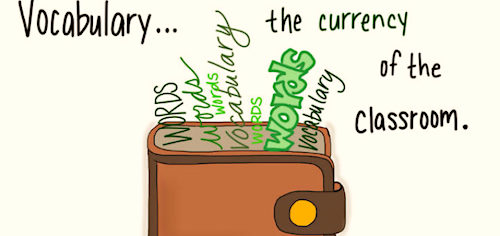All the Vocabulary Help You’re Likely to Need
Vocabulary! Under the canopy of state standards, student knowledge of academic language matters more than ever, all across the content areas.
As you begin to think about what your students will need this year (with assessments looming), strategies for building vocabulary may be near the top of your list.
At least that’s what our tally of MiddleWeb reader favorites seems to suggest. So we’ve gathered together our most popular vocabulary articles for easy clicking. We’re sure you’ll find some help and inspiration.
The 10-Minute Vocabulary Lesson

3 Strategies Help Students Decipher Unknown Words
Vocabulary knowledge is the heart of reading comprehension and academic achievement, says literacy consultant Brenda Overturf, “and it means way more than just learning words.” Students must have the tools to decipher unknown academic words. She shares three of the best.
Low Prep and No Prep Vocabulary Activities
How can teachers be more intentional about teaching vocabulary words given the limited instructional time available? Middle school History & ELA teacher Megan Kelly shares ways she has begun to add more vocabulary instruction into small pockets of class time using some fun, sticky strategies.
Teaching Vocabulary with Digital Tools
ELA teacher and former llama wrangler Lee Ann Spillane details how she teaches content-related vocabulary using several versatile digital tools including Quizlet and Vocabulary.com.

Interactive Word Walls Enliven Vocab Learning
To create classrooms where vocabulary learning thrives, Valentina Gonzalez recommends an interactive word wall – a large graphic organizer displaying critical vocabulary with related ideas and visuals added by students. Great across subjects, for ELLs and everyone else!
4 Vocab Steps Help Kids Grasp Information Text
Understanding concept words like ‘innovative’ can help students to make sense of complex nonfiction sources. Britany Harris and Sunday Cummins share a four-step process to introduce a few new vocabulary words before reading an information text and then focus on them as kids read, talk and write.
Use “Cycles” to Make Word Study Part of Everyday Learning
When it comes to learning new words, a few minutes goes a long way, says author-consultant Pam Koutrakos. Teachers can jump-start word study at any point in the year. Use her “cycle” strategy to fit vocabulary into the daily lesson flow and build students’ curiosity about words.
Vocab: How to Rock Greek & Latin Roots
When you think of Greek and Latin roots, you think high student engagement, right? No? ELA teacher Amber Chandler plans to make all those old roots rock as she introduces the concepts of language development and acquisition to her students.
Teaching Vocabulary in Word-Rich Classrooms
Students can learn difficult vocabulary when they are immersed in a rich array of words, says reading expert Janet Allen. In this excerpt from her best-selling collection of vocabulary teaching tools, Allen describes ways to create a word-rich environment. Includes reproducibles and links to two reviews of Allen’s popular flip book.
5 Ways to Assure Quality Exposure to New Words
What’s one of the best things a school day can offer? Exposure to newly learned words – provided that exposure is in context, well-timed, multisensory, and question-based. Literacy expert Amy Benjamin suggests five ways to achieve these “durable learning” goals.
My Students Are Begging to Review Vocabulary
Instead of just saying “study your vocabulary,” Amber Chandler is trying out Quizlet Live, an online team-based game that has students begging for more. She says the easy tech tool promotes collaborative competition, meets SEL needs, and requires little extra work.
Brain-Friendly Strategies for Your Vocab Toolbox
How can teachers use brain-friendly strategies to help students encode, store and retrieve vocabulary words? Educator and author Marilee Sprenger shares some high-interest activities designed for each stage of learning academic words. Some just require a few minutes!
Techniques and Tools to Teach Vocabulary
When it comes to vocabulary instruction, teachers have many, many questions. For example: “How can I fit vocabulary in? How should I pick the words? What should my quizzes look like?” Literacy consultant Sarah Tantillo provides answers to these questions and more – including a super resource that offers vocabulary word lists for many YA novels.
Use Tech Tools to Teach Vocabulary & Useful Words Galore
What’s the best way to teach vocabulary? It’s a constant topic among educators, writes Jeremy Hyler, and not just among his fellow ELA colleagues. Every classroom teacher needs to teach academic words. Hyler shares some vocabulary strategies he’s developed over 17 years.
25 Words That Trigger Student Understanding
Brain and learning expert Marilee Sprenger highlights the 25 most high-frequency words for learners in the English language to focus upon. “I call these words ‘essential’ because knowing and using them can boost academic success and lifelong learning.” Are they on your vocab list?
Sticky Techniques to Teach Academic Words
Traditional vocabulary strategies are passive exercises that have little impact in the long run, write Lynne Dorfman and Aileen Hower. Students need lots of exposure to a word before they can fully understand and apply it. They need frequent, engaging and meaningful encounters with words.

































